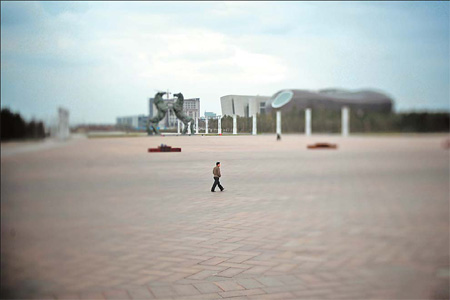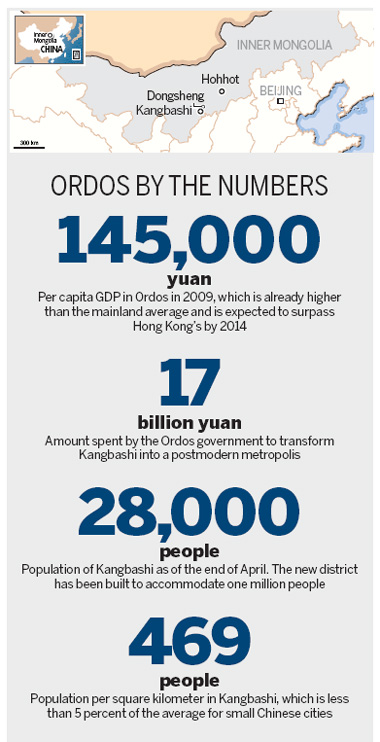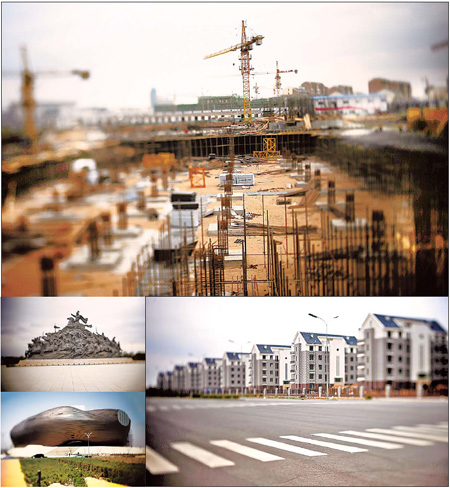Society
Ghost town
By Hu Yinan (China Daily)
Updated: 2010-06-10 09:23
 |
Large Medium Small |
|
 This picture taken in mid-May shows the empty Genghis Khan Square of Kangbashi in Inner Mongolia.?[China Daily] |
What if you built a glitzy new town but no one turned up to live in it? That is the state of affairs at Kangbashi, in Inner Mongolia.
Like most newcomers to Kangbashi, Wang Yuanyuan was instantly enthralled with its glittering towers, architectural wonders and grand sculpture gardens when she arrived in 2007. The only thing missing was people.
The 38-year-old teacher vividly recalled driving around for about an hour just to find somewhere to buy food. "All we found was an old woman selling spoonfuls of stuff on the roadside," she said.
"I'm used to it now, and thankfully development has been pretty rapid here," said Wang as she looked out of the kindergarten where she works - the only one in Kangbashi - which, like the rows of high-end houses around it, was built atop piles of sand.
Although today there are a lot more restaurants to choose from in this hastily built, 32-square-kilometer area among the sprawling dunes of the Inner Mongolia autonomous region, there are still relatively few diners to eat in them.

Kangbashi is the result of ambitious plans to create a glitzy, state-of-the-art commercial and residential zone launched by the city of Ordos in 2004.
Ordos is a prosperous mining city of about 1.6 million people, where per capita GDP - about 145,000 yuan ($21,200) - is already higher than the mainland average and is expected to surpass Hong Kong's by 2014, according to Lian Ji, the region's vice-chairman.
With the expansion of the desert and the increasing scarcity of water in recent decades, however, officials decided to relocate the city's government seat, and most of its residents, to Kangbashi, whose land was then occupied by two villages beside three reservoirs.
In just six years, the authority has spent a massive 17 billion yuan to transform the area into a stunning postmodern metropolis with spaceship-like government towers, Dubai-style skyscrapers, museums, libraries, theaters, sculpture squares and luxury bungalows.
Yet, by the end of April, this district, which was built to accommodate one million people, had a population of just 28,000.
Although a lot of the infrastructure has already been finished and a free shuttle bus service is in operation, the lack of hospitals, schools, taxis, cable television, high-speed Internet services and entertainment facilities has put many people off from joining the brand new community.
To make matters worse, ordinary residents in Dongsheng, the previous administrative center of Ordos where more than 300,000 people still live, have also complained that soaring property prices in Kangbashi have made relocation plans impossible. Despite recent nationwide policies to cool the housing market, apartments here now cost on average 7,000 yuan per square meter, almost twice the price last spring.
Government staff and their families, many of whom bought their homes at a discount of 50 percent or more, make up the vast majority of Kangbashi's current population. The number of public servants alone has reached 11,000, reported China Business, a daily Chinese-language newspaper.
The remaining houses were mostly bought by coal tycoons who "tend to buy at least three or four at a time and don't live here", according to local real estate agents.
A report provided to China Daily by officials in Kangbashi said that, as of April, all 9,090 apartments built in the area - enough to house 29,000 people - had been sold. Half of them, though, are empty, the report said.
The statistics mean life is pretty relaxed for those providing essential services, such as Zhang Pengfei, an officer of the district police bureau. Not a single murder or suicide has been reported in Kangbashi since early 2009, which is a "sign of social harmony", he said.
"We're trying to become the safest city in China and, to be frank, I think we are already among the best," said the 40-year-old, one of 51 police officers covering the sparse expanse of buildings.
The little crime that does happen in Kangbashi is usually nothing more than alcohol-fueled scuffles among the 10,000 migrant laborers who are its de facto residents.
Yan Xincheng, who hails from Jining in Shandong province, is one of a few workers who has spent the last six years helping to build the district from scratch. Sitting atop a nearly completed museum, the 44-year-old former miner said life in Kangbashi has offered him plenty of room to escape the complexities of urban life.
"When you look at it, this entire place looks like a giant free advertisement for developers," he said. "There's no one around."
GDP obsession
The "for rent" posters glued outside shuttered shops, the empty roads and the fact there are more street cleaners than pedestrians on most sidewalks combine to make Kangbashi a unique city district in China.
Although at the heart of the most affluent, resource-rich hub (Ordos has one-sixth of the country's coal reserves and one-third of its natural gas reserves) in a fast-growing and still heavily resource-dependent economy, analysts are concerned about the potential impact of the property bubble bursting.
In April, Time magazine branded Kangbashi a "ghost town" and cited it as an example of what it called an eerie evidence of property oversupply.
Other media reports have also criticized a "general obsession with GDP", which they claim has prompted governments to use taxpayers' money to build empty commercial and residential developments. The reliance on real estate in these new "towns" also leads to questions about the sustainability of their future growth.
|
 Using a tilt-shift lens, China Daily's photographer captured a series of shots of the sparsely populated Kangbashi, an ambitious commercial and residential district in Ordos in the Inner Mongolia autonomous region. Clockwise from top: One of many construction sites; a row of new apartment blocks; the district's new museum, and a public square featuring a sculpture of Genghis Khan. [Zhang Tao / China Daily] |
Among the many critics who say public interests were ignored before work to construct Kangbashi began is Pan Jie, former deputy general manager of Inner Mongolia's Ih Ju Chemical Industry Corp.
"The project simply started after a few leaders decided to go ahead with it," he said. "No public hearings were held and no prior feasibility studies were conducted. And where do those discounts on the cheap houses for public servants in Kangbashi come from?
"The people call this - the abuse of taxpayers' money - an act of collective corruption," added Pan.
Qiao Jinli, a senior Ordos publicity official, disagreed and insisted that the Kangbashi development has been well planned, and that the local population will in time catch up with accelerated development.
When contacted by China Daily, she advised against any further and deeper media probes into the matter, saying they were not constructive for local development, and refused to respond to allegations made by critics of the project.
"We're beyond a kids' fight, where I ought to throw a rock back at you if you threw one over first," she said.
Han Junli, a spokeswoman for the Kangbashi administrative committee, the acting district government, also argued that the district's extremely low population density (469 people per square kilometer) is one of its primary advantages.
Recalling her recent visit to the ongoing Shanghai World Expo, she said that Kangbashi, in comparison, is a "truly livable city".
"If there's a housing bubble around here, I don't feel it," said Han, who stressed that the district's long-term goal is to become a "political, cultural, technical and financial hub" of Inner Mongolia.
Publicity officer Qiao, however, slightly contradicted that vision by saying "public administration, culture, tourism and science and technology will be the four pillar industries" of the new district.
Education officials say 37,000 students from the Ordos No 1 Middle School in Dongsheng will be relocated to Kangbashi before the end of the year. That will likely increase the local population to about 100,000, said Han.
"That's just one of our many plans to boost the population here," she added.
No consultation
However, Zhang Caixia, who works at a restaurant in the district, said she is far from thrilled with how things are going.
"Business people can't rely on plans like (the school relocation)," said the 38-year-old, who comes from Hohhot, capital of the autonomous region. Her restaurant, which only opened last October, pulls in no more than 1,000 yuan a day.
"On bad days, we make only around 300 yuan," she said. "Few people even bother to come here. That'd probably change with more press coverage, though."
Most hotels, meanwhile, are relying on the occasional seminar and conference to bring in visitors, according to a senior manager in the local hospitality industry who did not want to be identified.
Despite the recent controversy, however, the Ordos government is still planning to expand Kangbashi to 355 square kilometers - more than 10 times its current area.
Multi-million dollar investments in publicly funded projects without any meaningful public consultation are not uncommon and sometimes they are not even approved by higher levels of authority. A recent report by the National Audit Office found that 5,735 hectares of land were assigned for construction before the relevant projects were ever given the green light.
Last month, Xinhua News Agency published a rare, harsh critique of a half-finished, fancy new district designed to be the new county seat for Qingshuihe, which is under the jurisdiction of Hohhot.
The poverty-stricken county in 1998 planned to invest more than 6 billion yuan in the project. However, work was halted two years ago when the money stopped pouring in.
The area is now a well-known "ghost town", complete with livestock running through abandoned buildings, just like some dystopian or post-apocalyptic movie.
While the total planned investment was far beyond Qingshuihe's financial capabilities, publicity officials in Ordos insist the situation in Kangbashi is "an entirely different matter altogether".
"We have the money for it," assured Qiao, the government spokeswoman.